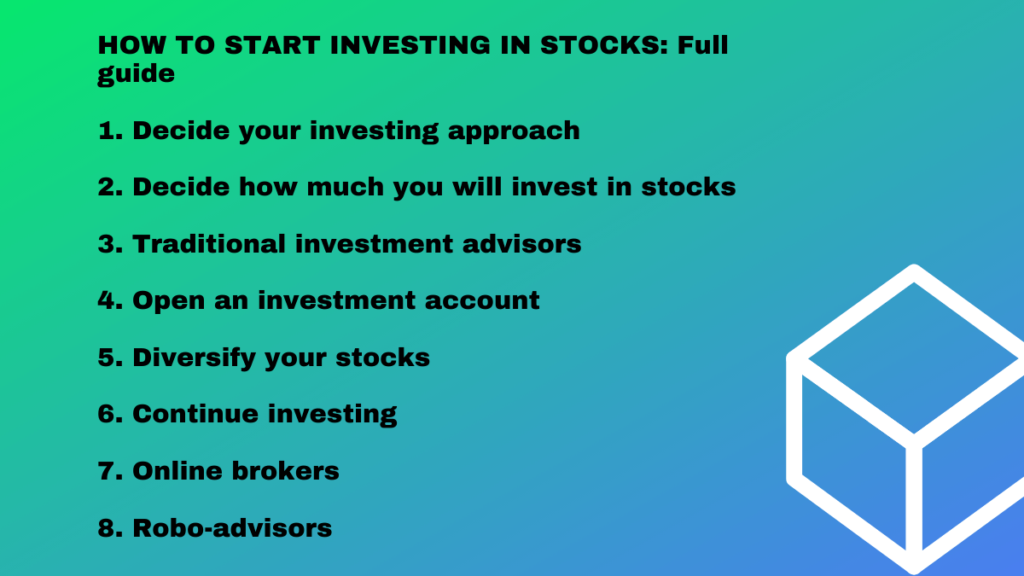How to Invest in Stocks For beginners: Full Guide
There is a lot you should know before you dive in. Here is a step-by-step guide to investing in the stock market to help you make sure that you are doing it correctly. How to Invest in Stocks For beginners.

How to Invest in Stocks For beginners: Full Guide
1. Decide your investing approach
Try this. Which of the following statements best describes you?
- Here I am an analytical person and enjoy doing number crunching and research.
- Here I hate math and don’t want to do a ton of “homework.”
- There I have several hours each week to devote to stock market investing.
- I like to read about different companies I can invest in, but don’t have any desire to dive into anything math related.
- I am a busy professional and do not have the time to learn how to analyze stocks.
Different ways to invest in the stock market:
And only then – you can invest in individual stocks if you have the time and willingness to research thoroughly and evaluate the stocks on an ongoing basis. How to Invest in Stocks For beginners.
A robo-advisor is a brokerage that essentially invests its own money in a portfolio of index funds that is appropriate for its age, risk tolerance, and investment goals.
| Index Funds It keeps track of the popular investment vehicle market. And can help balance your portfolio. | ETFs Exchange traded funds, or ETFs, provide comprehensive market exposure. One way stocks and similar trading. |
| Mutual Funds Passive mutual funds with low fees can provide great exposure to a complete collection of all stocks at once. | Bonds But it is a part of life for most people as the lenders. Companies and municipalities also borrow money using bonds. |
2. Decide how much you invest in stocks
While the stock market will almost certainly rise in the long run, there is simply too much uncertainty in share prices in the short term. How to Invest in Stocks For beginners.
Here are some examples of money that will be much better off in a high yield savings account than the stock market:
- Your emergency fund
- Next year’s vacation fund
- Even if you are socking away money for a down payment you will not be prepared to buy a house for many years
Asset allocation:
Here is a quick rule of thumb that can help you establish a ballpark asset allocation. Take your age and subtract it from 110 the approximate percentage of your investable money that the shares should have (this includes mutual funds and ETFs that are stock based). The rest should be in fixed income investments, like bonds or high yield CDs. You can then adjust this ratio below depending on you or your particular risk tolerance.
For example, suppose you are 40 years old. .
3. Traditional investment advisors
Going the robo-advisor route does not seem like a fit for you, so be assured you are not alone.
And there are often trade commissions for the purchase and sale of shares and bonds, as well as load fees paid for certain mutual funds.
I have had success using the Paladin Registry, a directory of fee-only financial planners that recommend financial advisors for you too live.
4. Open an investment account
All of the advice about investing in stocks for beginners doesn’t work very well for you, so you don’t really need to buy stocks in any way. To do this, you will need a special type of account called a brokerage account.
Type of account:
If you want easy access to your money, are investing for just one rainy day, or want to invest more than the annual IRA limit, then you probably want a standard brokerage account.
These accounts are of two types – Traditional and Roth IRAs are very tax-advantaged places to buy shares, but the downside can be difficult to withdraw your money until you get older.
Compare costs and features:
The majority of online stock brokers have eliminated trading commissions, so most (but not all) are on equal opportunity as far as costs are concerned.
However, there are many other big differences. For example, some brokers offer clients educational tools, access to investment research, and a variety of other features that are particularly useful for new investors. Others provide the ability to trade on foreign stock markets.
There is also user friendliness and functionality of the broker’s trading platform. I have done quite a few of them and can tell you direct that some are far more “unsightly” than others. Many will try a demo version before you make any money, and if so, I highly recommend it.
5. Diversify your stocks
- Diversify your portfolio.
- Invest only in businesses you understand.
- Always avoid penny stocks.
However, I would like to warn against too much diversification.
There we help you find trading stocks for attractive valuations. And if you want to add some exciting long-term growth prospects to your portfolio, the Development Investment Guide is a great place to start.
6. Continue investing
(Note: Warren Buffett is not only the most successful long-term investor ever, but also one of the best sources of knowledge for his investment strategy.)
The most surefire way to earn money in the stock market (or until you need money) is to buy stocks at a fair price and hold in order to remain.
7. Online brokers
In today’s investment universe, these are full service, discount brokers, that allow you to invest entirely online. The major advantage with online brokers is that you can invest in just about everything you choose.
Better platform investment tools and live support to help you improve your investment results.
A few examples of online brokers:

Zacks trades trades with the help of an online broker offering broker at no additional charge until they are made by phone.

Additionally, E * Trade offers 100 commissions-free ETFs and 4,400 no transaction fee mutual funds.
8. Robo-advisors
They begin like traditional investment advisory services. But the cost was only a fraction.
Robo-advisors charge less fees:
But they do not charge trade commissions because they do not trade individual stocks.
You complete a questionnaire, in which your investment deadlines, goals, and personal risk tolerance are set.
It will be constructed using low-cost, index-based ETFs, which enables Robo-Advisors to provide complete investment management at such low fees.
They’re great for every investor:
The best thing is that robo-advisors are available to investors at all levels.
A few examples of robo-advisors:

Upgradation 0.25% annual management fee. His digital package is in his account balance. Which requires a minimum balance of 0.

You do not spend anything on using your personal financial instruments in the capital. But the personal capital to manage your investment if you want.

M1 Finance is completely free, but it is a hybrid of robo-advisors and private management. But M1 will take on the task of rebalancing your portfolio.
Value stocks:
This way you can invest like Warren Buffett. He said that he has been using this strategy since the first time he stepped into investment in the 1950s.
High dividend stocks:
Historically, the return on almost half of the shares has come from dividends. The reason is that stocks with higher dividends tend to outperform over the long term.
There are several reasons why this is true:
- As discussed above, a high dividend yield is an indicator of a company with strong fundamentals.
- Many investors are looking for a combination of growth and income that provides high dividend stocks.
- The thing is that when the investor shares the qualities that also begin to realize income generation.
Although they are not always the best performers in a short period of time. They tend to be the best stocks themselves in the long run.
Growth stocks:
These are that the common stock market are growing faster than the companies. And are doing stocks of companies even faster than their competitors.
Nevertheless, growth stocks include the best type to hold for long-term return.
Investing in stocks for beginners:
It has three parts:
- You must have a steady income, enough to support your lifestyle, as well as extra room.
- You must be held safely in an emergency fund, high yield savings, covering unforeseen events. A good rule of thumb is having three to six months of living expenses.
- You’ve got in the habit of being a regular saver. Investing is a one-time event, but not a long-term process. It is a combination of growing your investment through regular contributions and investment returns.
You should invest in educating yourself:
Sometimes you do not understand something, especially investing in different stocks. You want to know as much about that business as possible, including the industry it operates in.








